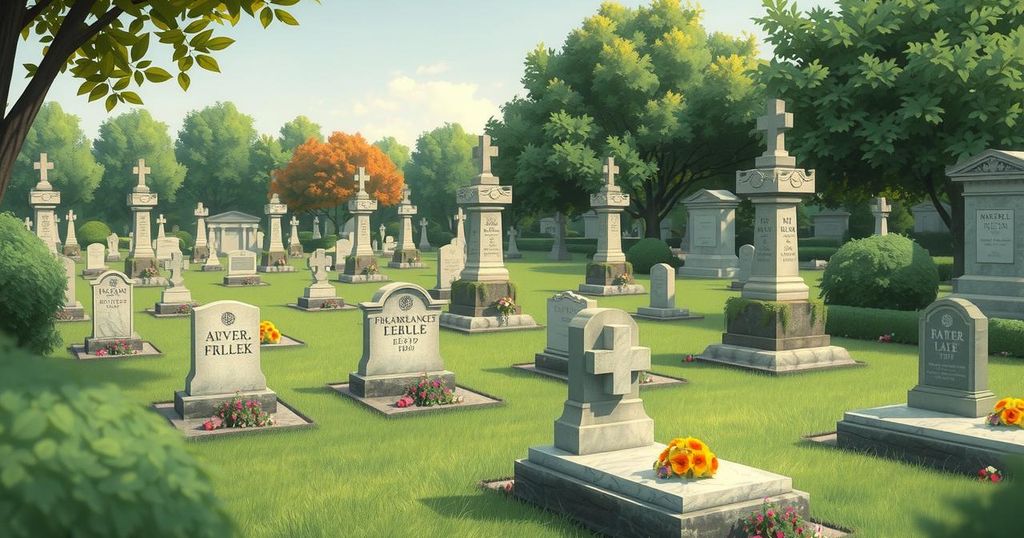Iran Condemned by UN for Denying Baha’i Cemetery Desecration Claims
The Iranian government was condemned by the UN for denying the desecration of Baha’i cemeteries. Special Rapporteur Nazila Ghanea highlighted violations against Baha’is and criticized the Iranian delegation’s misleading statements. Baha’is have faced extensive persecution, including forced burials and discriminatory practices across multiple Iranian cities. The situation underscores a systematic effort to suppress the rights of this religious minority.
On March 11, 2025, the Iranian government faced condemnation from the United Nations for its blatant denial of Baha’i cemetery desecrations. The UN Special Rapporteur on freedom of religion or belief, Professor Nazila Ghanea, stated that the Iranian authorities could not conceal their violations regarding the burial rights of Baha’is. This rebuke occurred during a UN Human Rights Council session where the Iranian representative refuted the findings reported by the Special Rapporteur concerning the systemic restrictions imposed on Baha’is regarding burial sites.
The Iranian government attempted to mislead the international community by asserting that land allocation for private cemeteries complied with national regulations. This claim was made in response to evidence indicating discrimination against the Baha’i community. Professor Ghanea emphasized that the Iranian delegation’s dismissive attitude undermined the reality of persecution conforming to the rights of religious minorities in Iran.
In a poignant statement, the Special Rapporteur remarked, “One cannot hide behind claims that a cemetery is private, to sideline state obligations in relation to its largest non-Muslim religious minority community, the Baha’is in Iran.” The destruction of hundreds of Baha’i cemeteries over decades illustrates discriminatory practices that hinder the community’s ability to mourn their deceased properly.
Former Special Rapporteur Heiner Bielefeldt previously characterized the persecution of Baha’is in Iran as extending from birth to death, labeling it as a profound manifestation of religious persecution today. Simin Fahandej, representing the Baha’i International Community, noted that the Iranian government not only denies Baha’is the right to live peacefully but also the right to die with dignity, highlighting a calculated endeavor to culturally extinguish the Baha’i identity in Iran.
Reports indicate that Baha’i cemeteries in at least 14 major Iranian cities have faced desecration or operational interference within the past year. Intelligence agents have taken over these cemeteries, imposing unnecessary fees on Baha’is and often denying them burial according to their faith. Cities affected include Tehran, Karaj, Shiraz, and others.
During the Human Rights Council discussions, Canada expressed its concern over these violations against Baha’is, affirming the need to protect burial rights for religious minorities. Baha’is in Iran have been subjected to extensive persecution since the Islamic Revolution in 1979, including forced burials in mass graves and denials of access to burial grounds.
Underpinning these violations is a longstanding policy established in 1991 aimed at impeding the Baha’i community’s development. This is evidenced in a document that restricts their access to education, employment, and cultural participation. Ongoing abuses include arbitrary detentions, physical and psychological maltreatment, and widespread discrimination, all of which are continually denied by Iranian officials.
The Baha’i International Community urges global stakeholders to advocate for the cessation of these unlawful actions and demand accountability from the Iranian government regarding its consistent human rights breaches.
In summary, the Iranian government’s denial of Baha’i cemetery desecrations was firmly condemned by the United Nations, as highlighted by Professor Nazila Ghanea. The actions against the Baha’i community reflect a broader pattern of religious persecution and cultural cleansing that has persisted since the 1979 Islamic Revolution. It is imperative for the international community to persistently advocate for the protection of the rights of Iranian Baha’is and hold the Iranian authorities accountable for their human rights violations.
Original Source: iranpresswatch.org




Post Comment